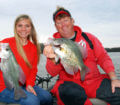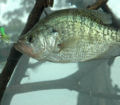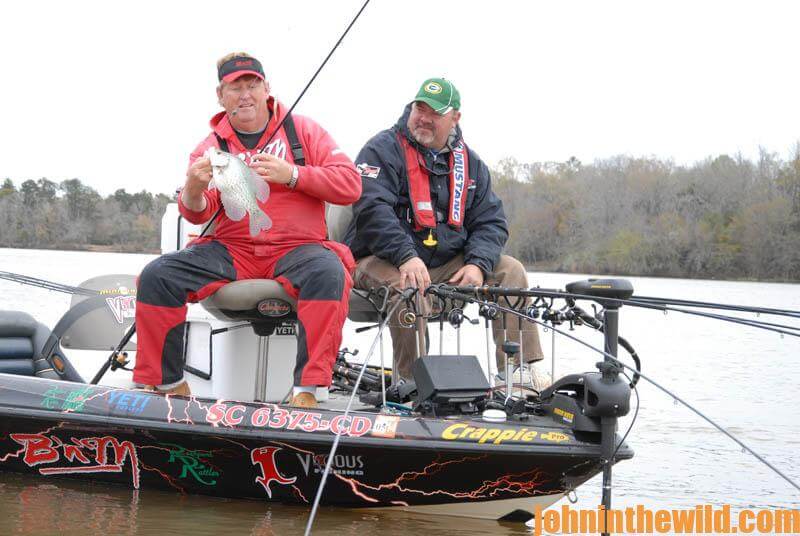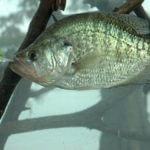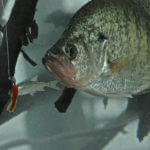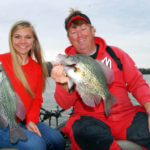Editor’s Note: Santa Claus has come down the chimney, and we’ve launched a new year. Most crappie fishermen have their poles rolled-up and stored under the porch, but not Whitey Outlaw of Gadsden, South Carolina. He fishes for crappie year-round and fishes on both crappie circuits, Crappie USA (https://www.crappieusa.com/About_Crappie_USA.cfm) and Crappie Masters (http://www.crappiemasters.net/home/). To help you catch papermouths this winter, we’ve asked Outlaw where he finds crappie and how he catches them.
There are many reasons that crappie fishermen don’t catch crappie in the wintertime. Here are the ten biggest reasons (see Days 2 & 3) that I think most crappie fishermen don’t catch crappie in the winter, and what you can do to solve these problems.
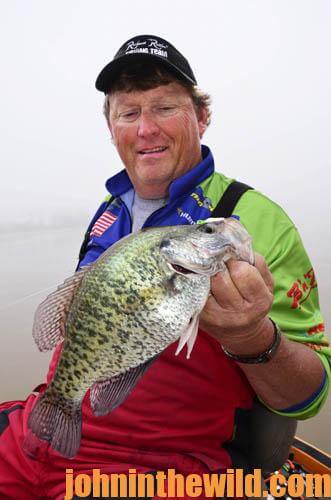 1) Most crappie fishermen fish too fast during the winter. The crappie’s biting metabolism has slowed-down at this time of year. They don’t want to chase a bait, they are not going to move very much, and if you get in a hurry, they are not going to be in a hurry. So, slow down your fishing, realize that you can’t fish as fast as you do during the spring, summer and early fall, and you still will be able to catch crappie in cold weather.
1) Most crappie fishermen fish too fast during the winter. The crappie’s biting metabolism has slowed-down at this time of year. They don’t want to chase a bait, they are not going to move very much, and if you get in a hurry, they are not going to be in a hurry. So, slow down your fishing, realize that you can’t fish as fast as you do during the spring, summer and early fall, and you still will be able to catch crappie in cold weather.
2) Most crappie fishermen use the same size line to fish in the winter as they do in the spring, summer and fall. When the water is cold like it is in the wintertime, I will fish 6-8-pound-test line. I believe the fish can see the line better in the winter months, and you have to use lighter line to fish deeper. If you will back off your line size and respool your reels with lighter line, you will catch more winter crappie.
3) You are fishing with too big a bait. Remember in the winter months that crappie are not eating as much as they are during the spring, summer and fall, and they are eating smaller baits. If you are fishing jigs, you should be fishing a 1/32-ounce jig, and if you are fishing with minnows, use medium to small minnows.
4) You are fishing the wrong area of the lake. At this time of the year, most crappie fishermen will be fishing at the mouth of a creek, assuming that the crappie are holding at the mouth of the creek, waiting on warmer weather to actually move into the creek and up the creek channel to get to the spawning grounds. Another place you are probably fishing is in the back of the creek, so you can get out of the wind and be able to fish without being beaten-up by high waves and rough water. If you are going to catch crappie this month, you’ll have to fight the wind. I like to be out on the main lake in that rough water, fighting the wind and catching the crappie. Another advantage that you have when you fish the old river channel out on the main lake is rarely will you ever see another crappie fisherman out there fishing for the crappie you’ve found. When you locate crappie on these old river channels, you often can go back to those same places for several days and continue to catch crappie.
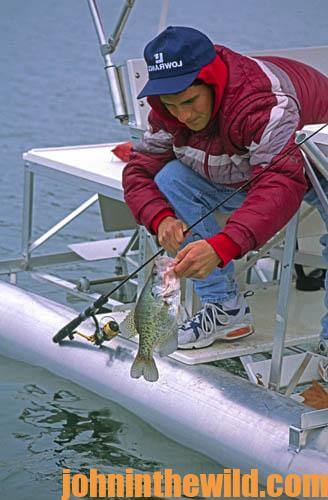 5) You quit too quickly. Many crappie fishermen – if they are not catching fish within an hour or two – roll up their poles and head home. But crappie are not going to bite all day long during the winter months. If you are going to catch them, you have to be there when they decide they want to bite. Therefore if you are going to catch crappie this month when you decide to go crappie fishing, also decide to stay on the lake from daylight to dark. If you put in the hours and find the fish, they will bite at some time that day. All you really have to do to catch them is be there when they want to bite.
5) You quit too quickly. Many crappie fishermen – if they are not catching fish within an hour or two – roll up their poles and head home. But crappie are not going to bite all day long during the winter months. If you are going to catch them, you have to be there when they decide they want to bite. Therefore if you are going to catch crappie this month when you decide to go crappie fishing, also decide to stay on the lake from daylight to dark. If you put in the hours and find the fish, they will bite at some time that day. All you really have to do to catch them is be there when they want to bite.
To learn much more about crappie fishing, get John E. Phillips’ Kindle eBooks, and print and Audible books by going to https://johninthewild.com/books/#crappie or to www.barnesandnoble.com for Nook books. To receive and download for free “The Crappie Catchers’ Cookbook,” by John and Denise Phillips, go to https://johninthewild.com/free-books.

